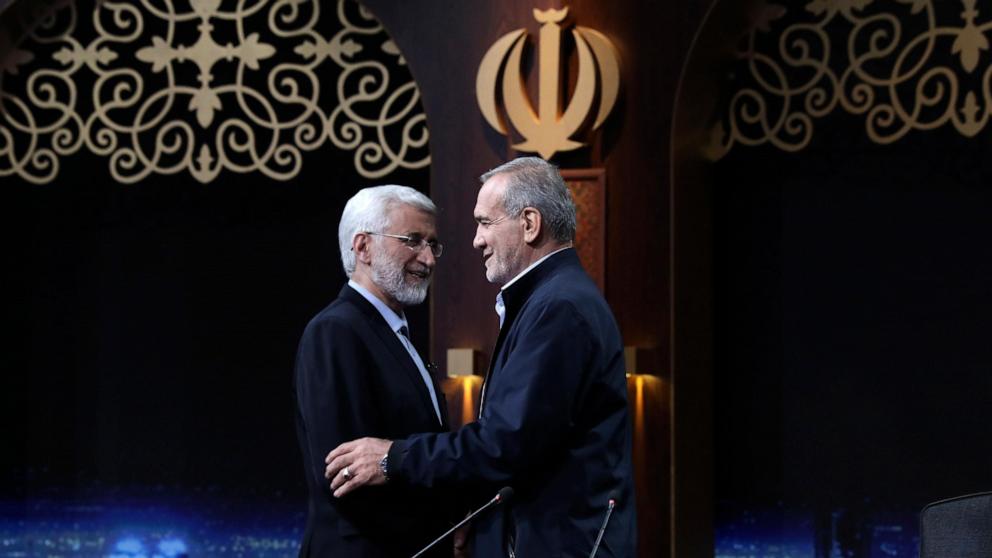Iranians have begun a runoff election to decide who will succeed President Ebrahim Raisi, who died in a helicopter crash last month, as years of economic crisis, mass protests and tensions have led to widespread public apathy in the country…
DUBAI, United Arab Emirates — Iranians began a runoff election Friday to decide who would succeed late President Ebrahim Raisi, who died in a helicopter crash last month, as years of economic crisis, mass protests and tensions in the Middle East have led to widespread public apathy in the country.
Voters will choose between Saeed Jalili, a hardline former nuclear negotiator, and Massoud Pezeshkian, a heart surgeon and longtime member of parliament who has aligned himself with moderates and reformists within Iran's Shiite theocratic state.
In the first round of voting on June 28, no candidate received more than 50% of the vote, leading to a runoff election. It also saw the lowest turnout in Iranian elections history, raising major doubts about Friday's turnout.
Calls for a boycott have been made, including by jailed Nobel Peace Prize winner Narges Mohammadi, but in the absence of a widely recognised opposition movement active inside or outside Iran, Iranian voters appeared to have decided last week not to take part in the polls themselves.
State television showed footage of low-key queues at several polling stations across the country as polls opened on Friday.
As has been the case since the 1979 Islamic Revolution, women and those seeking radical change will be barred from voting, and the vote itself will not be monitored by internationally recognized observers.
The vote comes amid rising tensions across the Middle East over the war between Israel and Hamas in the Gaza Strip. In April, Iran launched its first direct attack on Israel over the Gaza war, while militias in the region that Iran supplies weapons to, such as Lebanon's Hezbollah and Yemen's Houthi rebels, have joined the fighting and intensified their attacks.
Iran, meanwhile, continues to enrich uranium to near weapons-grade levels and maintains a stockpile large enough to build several nuclear weapons. The nuclear deal that officials now backing Pezeshkian struck with world powers in 2015 collapsed in 2018 when then-President Donald Trump unilaterally withdrew the United States from it. Hardliners have since held all of the power in the Iranian government.
While Iran's 85-year-old Supreme Leader Ayatollah Ali Khamenei has the final say on all state affairs, the president can shift the country's policies toward confrontation or negotiations with the West.
Interior Minister Ahmad Vahidi, who is overseeing the elections, announced that all polling stations were opened at 8 a.m. local time.
Khamenei cast one of the first votes in the election from his home, with television cameras and photographers filming him placing his ballot in a ballot box.
“I hear that people's enthusiasm is stronger than before,” Khamenei said. “God willing, people will vote and choose the best candidate.”
But Khamenei said Wednesday that those who did not vote last week were not opposed to Shiite theocracy in the country.
“There are reasons behind this issue that sociologists and political actors should look into,” he said.
More than 61 million Iranians aged 18 and over are eligible to vote, of which 18 million are between 18 and 30. Elections are due to end at 6pm local time but traditionally are extended until midnight to increase voter turnout.
Friday's election will be Iran's second presidential runoff since 1979. The first was in 2005, when hardline president Mahmoud Ahmadinejad defeated former President Akbar Hashemi Rafsanjani. Under Ahmadinejad, Iran faced international sanctions over its nuclear program and the 2009 Green Movement protests and the crackdown that suppressed them.
Pezeshkian's supporters have warned that Jalili would set up a “Taliban”-style government in Tehran, while Jalili has accused him of waging a campaign of fear.
Raisi, 63, died in a helicopter crash on May 19 that also killed Iran's foreign minister and other members. Raisi was a protégé of Khamenei and was seen as a possible successor to the supreme leader. Yet he is known to many for his role in Iran's 1988 mass executions and in the bloody crackdown on dissent that followed protests in 2022 after police detained Mahsa Amini on suspicion of improperly fulfilling her hijab obligations.
___
Karimi reported from Tehran, Iran.

